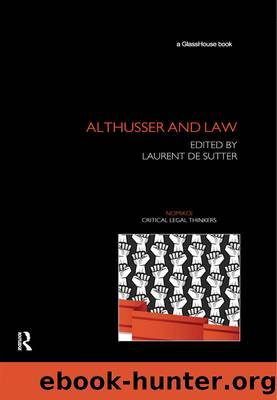Althusser and Law by De Sutter Laurent;

Author:De Sutter, Laurent;
Language: eng
Format: epub
ISBN: 1143703
Publisher: Routledge
Chapter 5
* * *
Prohibitionary law as apparatus of subjectivation
Butler's Psychic Life of Power and Althusser
Yoshiyuki Sato
* * *
In The Psychic Life of Power,1 Judith Butler tries to elucidate the mechanism of subject formation in its relation to power. She refers there to Hegel's and Nietzsche's philosophies, to Freud's and Lacan's psychoanalytical theories, and to Althusser's and Foucault's theories of power. The most important theory in these references is Althusser's, because the ‘turn’ towards power is the notion that Althusser poses in his famous essay ‘Ideology and Ideological State Apparatuses’. What interests us here is that Butler reinterprets the notion of the interpellation of Ideological State Apparatuses and reformulates it as the interpellation of prohibitionary law. Why does she think of subjectivation in terms of the prohibitionary law? What is at stake in this reinterpretation of Althusser's theory? Starting from these questions, we will discuss the problem of subjectivation and resistance in Butler's theory in relation to Althusser's and Foucault's theories.2
Subjectivation
Butler's perspective in The Psychic Life of Power is clear: the process of subject formation or subjectivation consists in a process of the subordination of subject to power. She describes this process by the notion of ‘subjection’ or ‘subjectivation’ (translation of French word assujettissement, a notion used by Althusser and Foucault, emphasizing the meaning of subjugation). In the Introduction, she explains the purpose of this book:
‘Subjection’ signifies the process of becoming subordinated by power as well as the process of becoming a subject. Whether by interpellation, in Althusser's sense, or by discursive productivity, in Foucault's, the subject is initiated through a primary submission to power. Although Foucault identifies the ambivalence in this formulation, he does not elaborate on the specific mechanisms of how the subject is formed in submission. Not only does the entire domain of the psyche remain largely unremarked in his theory, but power in this double valence of subordinating and producing remains unexplored. Thus, if submission is a condition of subjection, it makes sense to ask: What is the psychic form that power takes? Such a project requires thinking the theory of power together with a theory of the psyche, a task that has been eschewed by writers in both Foucauldian and psychoanalytic orthodoxies.
(Butler, 1997: 2–3)
Download
This site does not store any files on its server. We only index and link to content provided by other sites. Please contact the content providers to delete copyright contents if any and email us, we'll remove relevant links or contents immediately.
American Kingpin by Nick Bilton(3886)
Future Crimes by Marc Goodman(3598)
The Meaning of the Library by unknow(2571)
Inside the Middle East by Avi Melamed(2356)
Why Nations Fail: The Origins of Power, Prosperity, and Poverty by Daron Acemoglu & James Robinson(2297)
On Tyranny by Timothy Snyder(2231)
Living Silence in Burma by Christina Fink(2071)
Putin's Labyrinth(2022)
The Mastermind by Evan Ratliff(1937)
The Smartest Kids in the World by Amanda Ripley(1856)
Think Like a Rocket Scientist by Ozan Varol(1819)
Law: A Very Short Introduction by Raymond Wacks(1747)
It's Our Turn to Eat by Michela Wrong(1730)
The Rule of Law by Bingham Tom(1698)
Philosophy of law a very short introduction by Raymond Wacks(1670)
Leadership by Doris Kearns Goodwin(1638)
A Dirty War by Anna Politkovskaya(1630)
Information and Communications Security by Jianying Zhou & Xiapu Luo & Qingni Shen & Zhen Xu(1621)
Civil Procedure (Aspen Casebooks) by Stephen C. Yeazell(1556)
